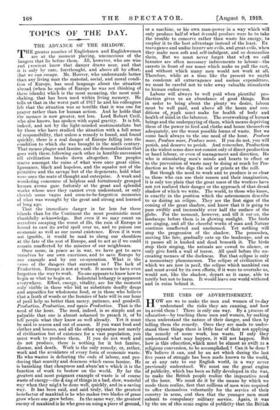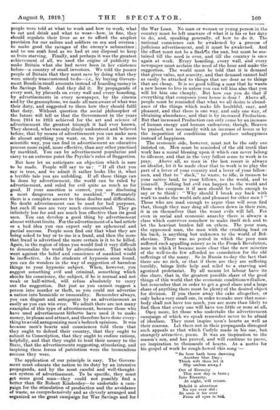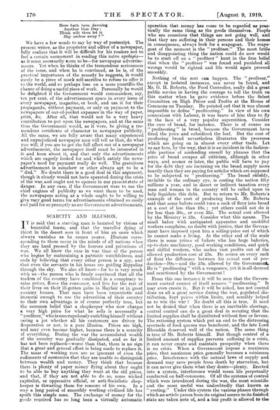THE USES OF ADVERTISEMENT. H OW are we to make the
men and women of to-day understand the risks they are running, and how tq avoid them! There is only one way. By a process of education—by teaching these men and women, by making them understand the nature of their danger, and then by telling them the remedy. Once they are made to understand these things there is little fear of their not applying the remedy of more work, less waste. If only they understand what may happen, it will not happen. But how is this education, which must be almost as swift as a religious conversion, to be accomplished! Can it be done We believe it can, and by an art which during the last five years of struggle has been made known to the world, or at any rate to our English world, in a way never previously understood. We must use the great engine of publicity, which has been so fully developed in the war, to make the British people realize the imperative need of the hour. We must do it by the means by which we made them realize, first that millions of men were required to offer themselves voluntarily for the service of their country in arms, and then that the younger men must submit to compulsory military service. Again, it was by the use of this Bathe engine of publicity that the British people were told at what to work and how to work, what to eat and drink and what to wear—how, in fine, they should regulate their lives so as to afford the amplest provision for our sailors and soldiers on sea and oversea ; to make good the ravages of the enemy's submarines ; and to use such food as we had at our disposal to keep us from starving. Finally, and perhaps it was the greatest achievement of all, we used the engine Of publicity to make Britain what she had never been in her existence before—a country of small investors. We told the poorer people of Britain that they must save by doing what they were utterly unaccustomed to do—i.e., by buying Government Bonds in small amounts instead of hoarding money in the Savings Bank. And they did it. By propaganda of every sort, by placards on every wall and every hoarding, by advertisements in every newspaper, by the cinema and by the gramophone, we made all men aware of what was their duty, and suggested to them how they should fulfil that duty. Without question the social philosopher of the future will tell us that the Government in the years from 1914 to 1915 achieved for the art and science of advertisement the greatest triumph it had ever known. They showed, what was only dimly understood and believed before, that by means of advertisement you can make men do almost anything you want, or, to put it in a more scientific way, you can find in advertisement an educative process more rapid, more effective, than any other practised by mankind. You can by advertisement popularize and carry to an extreme point the Psychic's rules of Suggestion.
But here let us anticipate an objection which is sure to be made. People will' say to us : "If all that you say is true, and we admit it rather looks like it, what a terrible tale you are unfolding. If all these things can be done by advertisement, the world can be ruled by advertisement, and ruled for evil quite as much as for good. If your assertion is correct, you are disclosing a most dangerous secret to mankind." Fortunately there is a complete answer to these doubts and difficulties. No doubt advertisement can be used for bad purposes, but such ill uses are very much circumscribed. They go infinitely less far and are much less effective than its good uses. You can develop a good thing by advertisement almost without limits. For the advertisement of a bad article or a bad idea you can expect only an ephemeral and partial success. People soon find out that what they are being asked to buy or to Use is a fraud, and then the more that fraud is advertised the more certain is it to be killed. Again, in the region of ideas you would find it very difficult to demoralize the world by advertisement. That which went against the belief and conscience of mankind would be ineffective. As the students of hypnosis soon found, you can do wonders in the way of suggestion of harmless things to your hypnotic subject. When, however, you suggest something evil and criminal, something which shocks his conscience, the subject, if he is normal and not weak or half-witted, will refuse absolutely to carry out the suggestion. But just as you cannot suggest a person into murder or theft, so you could not advertise a nation into 'homicide or immorality. Remember always, you can disgust and antagonize by an advertisement as easily as you can win over. We admit there are not many examples of this type of advertisement, because those who have used advertisement hitherto have used it to make money, to please and attract, and therefore have done everything to avoid antagonizing men's bedrock opinions. It was because men's hearts and consciences told them that they ought to defend their country, that they ought to submit to Conscription, that they ought to endure rations, helpfully, and that they ought to lend their money to the State, that the advertisements suggesting, stimulating, and inspiring these forms of patriotism were the tremendous success they were.
The application of our principle is easy. The Government must educate the nation to its duty by an intensive propaganda, and by the most careful and well-thoughtout system of advertisement. To be specific, they must get some good man—they could not possibly find a better than Sir Robert Kindersley—to undertake a campaign for the stimulation of production and the avoidance of waste, as comprehensively and as cleverly arranged and organized as the great campaign for War Savings and for the War Loan. No man or woman or young person in the country must be left unaware of what it is his or her duty to do, and, speaking generally, of how to do it. The national conscience can be awakened by a process of judicious advertisement, and it must be awakened. And the effort must not be a flasholn the pan, but must be sustained till the need is over, and till the country is once again at work. Every hoarding, every wall, and every newspaper must acclaim the need of the hour and make the suggestion. The world must be told that it is demand that gives value, not scarcity, and that demand cannot half as easily be attached to things that are dear as to things that are cheap. It is no good telling a man that he wants a new house to live in unless you can tell him also that you will let him one cheaply. But how can you do that if everything that composes your house is dear ? Above all, people must be reminded that what we all desire is abundance of the things which make life healthful, easy, and pleasant, and that there is one way, and only one way, of obtaining abundance, and that is by increased Production. But that increased Production can only come by an increase of human energy and human endeavour, though, Heaven be praised, not necessarily with an increase of hours or by the imposition of conditions that produce unhappiness instead of happiness.
The economic side, however, must not be the only one insisted on. Men must be reminded of the old truth that work has a moral blessing upon it which can never belong to idleness, and that in the very fullest sense to work is to pray. Above all, as man in the last resort is always an idealist, let it be made clear that to work is to play the part of a lover of your country and a lover of your fellowmen, and that to "slack," to waste, to idle, is treason to your native land, to your fellows, to the world, and• to ydurself. Nothing but evil can happen to the world and those who compose it if men should be fools enough to say or to think : "Why should I break my back with work to make the world safe and pleasant for other men ? " Those who are mad enough to argue thus will soon find that, though they may drag all classes down in their ruin, it is on themselves that the worst evils will fall. For even in social and economic anarchy there is always a class which contrives somehow to make itself rich and to let the heaviest burden fall on others. The poor man, the oppressed man, the man with the crushing load on his back, is anything but unknown to the world of Bolshevism. There was no period in which the poor man suffered such appalling misery as in the French Revolution, none in which it became more clear that the new miseries of the well-to-do few afforded no consolation for the old sufferings of the many. So in Russia to-day the fact that there are no rich, or that if there are they are suffering terribly, brings little help and relief to a starving and agonized proletariat. By all means let labour have its due share, that is, the greatest possible share of the good things of this world that the economic conditions will allow, but remember that in order to get a good share and a large share of anything there must be plenty of the desired object for division. If you throw away the cake altogether, or only bake a very small one, in order to make sure that somebody shall not have too much, you are more than likely to find then that every one will have too little or none at all.
Once, more, let those who undertake the advertisement campaign of which we speak remember never to be afraid of idealism. They must inspire men's hearts as well as their reasons. Let them not in their propaganda disregard such appeals as that which Carlyle made in his one, but strangely attractive, poem. It was an inspiration to the mason's son, and has proved, and will continue to prove, an inspiration to thousands of hearts. As a motto for his gospel of work he rough-hewed this song .— "So here hath been dawning
Another blue Day : Think wilt thou let it Slip useless awa3;1' Out of Eternity This new day is born ; Into Eternity, At night, will return.
Behold it aforetime No eye ever did:
So soon it for ever . From all eyes is hid.
Here hath been dawning Another blue Day; Think wilt thou let it Slip useless away I"
We have a few words to say by way of postscript. The present writer, as the proprietor and editor of a newspaper, fully realizes that it will be difficult for his readers not to feel a certain amusement in reading this naive apologia— as it must necesiarily Baena to be—for newspaper advertisements. Yet when he thinks of the tremendous seriousness of the issue, and when he is convinced, as he is, of the practical importance of the remedy he suggests, it would surely be a piece of mock self-sacrifice to refuse to offer it to the world, and so perhaps lose on a mere punctilio the chance of doing a useful piece of work. Personally he would be delighted if the Government would commandeer, say, ten per cent. of the advertisement space in every issue of every newspaper, magazine, or book, and use it for their propaganda, without payment, or only on payment to the newspapers of out-of-pocket expenses in the way of paper, print, &c. After all, that would not be a very heavy contribution to put upon the newspapers, and at the same time the Government would, as it were, be giving a tremendous certificate of character to newspaper publicity. All the same, we are fully aware that many experienced and unprejudiced newspaper men will tell us that, do what you will, if you are to get the full effect out of a newspaper advertisement, the newspaper itself must be interested in it and keen about it, and that only the advertisements which are eagerly looked for and which satisfy the newspaper's need for payment really do well. The gratuitous advertisement is somehow or other always apt to be a "dud." No doubt there is a good deal in this argument, though it clearly would not have operated during the crisis of the war, and ought not to operate in our present state of danger. In any case, if the Government were to use the chief engines of publicity as we want them to be used, the newspapers acting as a whole ought to be willing to give very good terms for advertisements obtained so easily and paid for so promptly as are Government advertisements.




































 Previous page
Previous page